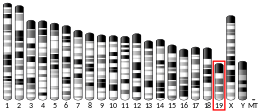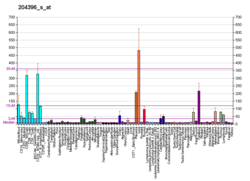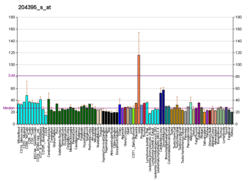G단백질결합수용체키나제5는 Ser /Thr단백질키나제스 의 G단백질결합수용체키나제 하위 계열의 구성원으로 GRK4 및 GRK6 와 가장 유사하다.[5] [6] [7] 단백질 은 G단백질 결합 수용체의 활성 형태를 만들어 신호를 조절 한다.
함수 G단백질결합수용체 키노리산 활성 G단백질결합수용체들은 수용체에 아레스틴 단백질의 결합을 촉진한다. 인광 활성 수용체에 대한 아레스틴 결합은 이질성 G 단백질 변환기 단백질의 수용체 자극을 방지하여 세포신호를 차단하고 수용체 감소 를 초래한다. 아레스틴 결합은 또한 수용체를 특정 세포 내분화 경로 로 유도하여 세포 표면에서 수용체를 제거하고 추가적인 활성화를 방지한다. 인산화 활성 수용체에 대한 아레스틴 결합도 아레스틴 파트너 단백질을 통한 수용체 신호 전달을 가능하게 한다. 따라서 GRK/arrestin 시스템은 G 단백질 결합 수용체에 대한 복잡한 신호 스위치 역할을 한다.[8]
GRK5 및 이와 밀접하게 연관된 GRK6 인산화 수용체들은 (반대의 효과가 있는 GRK2 와 GRK3 와는 대조적으로) 구속 매개 수용체 감소화, 내성화 및 인신매매보다는 구속 매개 신호를 장려하는 현장의 GRK6 인산화 수용체들이다.[9] [10] 이러한 차이는 수용체에 대한 약물 결합이 수용체가 그 수용체에 의해 자극된 작용의 특정 부분집합을 향해 신호를 보내는 편향될 수 있는 약리학적 편향 작용 (기능적 선택성이라고 도 함)의 한 가지 근거다.[11] [12]
GRK5는 몸 전체에 널리 표현되지만 폐, 심장, 태반에서 두드러지게 높은 발현을 가지고 있으며, 낮은 단계에서는 광범위한 발현을 하고 있다.[13] 인간에게 있어 아프리카 조상을 가진 개인에게 가장 많이 나타나는 잔류물 41(글루타민보다는 류신)에서 GRK5 염기서열 다형성은 천식 의 약물 표적인 기도 베타2-아드레날린 수용체 의 GRK5 매개 감소화 상승으로 이어진다.[14] 마우스에서는 GRK5가 기도와 뉴런에 있는 무스카린 아세틸콜린 수용체 의 M2 아형을 조절하고 있으며, GRK5가 부족한 생쥐는 알츠하이머병 모델 로 제안되어 왔다.[15] [16] [17] 제브라피쉬와 인간에서 GRK5 기능의 상실은 이단성 으로 인한 심장 결함과 연관되어 있는데, 이는 유기생식 중 부적절한 좌-우측 횡격으로 인해 발생하는 일련의 발달 결함이다.[18] 생쥐 심장에서 GRK5의 과다압박은 GRK5가 베타2-아드레날린 수용체를 조절하는 것으로 나타났으나 GRK5 과다압박 또는 삭제는 심장에서의 Angiotensin II AT1 수용체 에 의한 신호에 영향을 미치지 않는다.[19] [20]
참조 ^ a b c GRCh38: 앙상블 릴리스 89: ENSG00000198873 - 앙상블 , 2017년 5월^ a b c GRCm38: 앙상블 릴리스 89: ENSMUSG00000003228 - 앙상블 , 2017년 5월^ "Human PubMed Reference:" . National Center for Biotechnology Information, U.S. National Library of Medicine .^ "Mouse PubMed Reference:" . National Center for Biotechnology Information, U.S. National Library of Medicine .^ Kunapuli P, Benovic JL (Jun 1993). "Cloning and expression of GRK5: a member of the G protein-coupled receptor kinase family" . Proceedings of the National Academy of Sciences . 90 (12): 5588–92. Bibcode :1993PNAS...90.5588K . doi :10.1073/pnas.90.12.5588 PMC 46766 PMID 7685906 . ^ Premont RT, Inglese J, Lefkowitz RJ (1995). "Protein kinases that phosphorylate activated G protein-coupled receptors". The FASEB Journal . 9 (2): 175–182. doi :10.1096/fasebj.9.2.7781920 . PMID 7781920 . S2CID 20428064 . ^ "Entrez Gene: GRK5 G protein-coupled receptor kinase 5" .^ Gurevich VV, Gurevich EV (2019). "GPCR Signaling Regulation: The Role of GRKs and Arrestins" . Frontiers in Pharmacology . 10 : 125. doi :10.3389/fphar.2019.00125 PMC 6389790 PMID 30837883 . ^ Kim J, Ahn S, Ren XR, Whalen EJ, Reiter E, Wei H, Lefkowitz RJ (2005). "Functional antagonism of different G protein-coupled receptor kinases for beta-arrestin-mediated angiotensin II receptor signaling" . Proceedings of the National Academy of Sciences . 102 (5): 1442–1447. Bibcode :2005PNAS..102.1442K . doi :10.1073/pnas.0409532102 PMC 547874 PMID 15671181 . ^ Ren XR, Reiter E, Ahn S, Kim J, Chen W, Lefkowitz RJ (2005). "Different G protein-coupled receptor kinases govern G protein and beta-arrestin-mediated signaling of V2 vasopressin receptor" . Proceedings of the National Academy of Sciences . 102 (5): 1448–1453. Bibcode :2005PNAS..102.1448R . doi :10.1073/pnas.0409534102 PMC 547876 PMID 15671180 . ^ Zidar DA, Violin JD, Whalen EJ, Lefkowitz RJ (2009). "Selective engagement of G protein coupled receptor kinases (GRKs) encodes distinct functions of biased ligands" . Proceedings of the National Academy of Sciences . 106 (24): 9649–9654. Bibcode :2009PNAS..106.9649Z . doi :10.1073/pnas.0904361106 PMC 2689814 PMID 19497875 . ^ Choi M, Staus DP, Wingler LM, Ahn S, Pani B, Capel WD, Lefkowitz RJ (2018). "G protein-coupled receptor kinases (GRKs) orchestrate biased agonism at the β2-adrenergic receptor" . Science Signaling . 11 (544): eaar7084. doi :10.1126/scisignal.aar7084 PMID 30131371 . ^ Kunapuli P, Benovic JL (1993). "Cloning and expression of GRK5: a member of the G protein-coupled receptor kinase family" . Proceedings of the National Academy of Sciences . 90 (12): 5588–5592. Bibcode :1993PNAS...90.5588K . doi :10.1073/pnas.90.12.5588 PMC 46766 PMID 7685906 . ^ Wang WC, Mihlbachler KA, Bleecker ER, Weiss ST, Liggett SB (2008). "A polymorphism of G-protein coupled receptor kinase5 alters agonist-promoted desensitization of beta2-adrenergic receptors" . Pharmacogenetics and Genomics . 18 (8): 729–732. doi :10.1097/FPC.0b013e32830967e9 . PMC 2699179 PMID 18622265 . ^ Gainetdinov RR, Bohn LM, Walker JK, Laporte SA, Macrae AD, Caron MG, Lefkowitz RJ, Premont RT (1999). "Muscarinic supersensitivity and impaired receptor desensitization in G protein-coupled receptor kinase 5-deficient mice" . Neuron . 24 (4): 1029–1036. doi :10.1016/S0896-6273(00)81048-X PMID 10624964 . S2CID 7788715 . ^ Walker JK, Gainetdinov RR, Feldman DS, McFawn PK, Caron MG, Lefkowitz RJ, Premont RT, Fisher JT (2004). "G protein-coupled receptor kinase 5 regulates airway responses induced by muscarinic receptor activation". American Journal of Physiology. Lung Cellular and Molecular Physiology . 286 (2): L312–L319. doi :10.1152/ajplung.00255.2003 . PMID 14565944 . ^ He M, Singh P, Cheng S, Zhang Q, Peng W, Ding X, Li L, Liu J, Premont RT, Morgan D, Burns JM, Swerdlow RH, Suo WZ (2016). "GRK5 Deficiency Leads to Selective Basal Forebrain Cholinergic Neuronal Vulnerability" . Scientific Reports . 6 : 26116. Bibcode :2016NatSR...626116H . doi :10.1038/srep26116 . PMC 4872166 PMID 27193825 . ^ Lessel D, Muhammad T, Casar Tena T, Moepps B, Burkhalter MD, Hitz MP, Toka O, Rentzsch A, Schubert S, Schalinski A, Bauer UM, Kubisch C, Ware SM, Philipp M (2016). "The analysis of heterotaxy patients reveals new loss-of-function variants of GRK5" . Scientific Reports . 6 : 33231. Bibcode :2016NatSR...633231L . doi :10.1038/srep33231 . PMC 5020398 PMID 27618959 . ^ Rockman HA, Choi DJ, Rahman NU, Akhter SA, Lefkowitz RJ, Koch WJ (1996). "Receptor-specific in vivo desensitization by the G protein-coupled receptor kinase-5 in transgenic mice" . Proceedings of the National Academy of Sciences . 93 (18): 9954–9959. Bibcode :1996PNAS...93.9954R . doi :10.1073/pnas.93.18.9954 PMC 38536 PMID 8790438 . ^ Rajagopal K, Whalen EJ, Violin JD, Stiber JA, Rosenberg PB, Premont RT, Coffman TM, Rockman HA, Lefkowitz RJ (2006). "Beta-arrestin2-mediated inotropic effects of the angiotensin II type 1A receptor in isolated cardiac myocytes" . Proceedings of the National Academy of Sciences . 103 (44): 16284–16289. Bibcode :2006PNAS..10316284R . doi :10.1073/pnas.0607583103 PMC 1637574 PMID 17060617 .
추가 읽기 Komolov KE, Bhardwaj A, Benovic JL (Aug 2015). "Atomic Structure of GRK5 Reveals Distinct Structural Features Novel for G Protein-coupled Receptor Kinases" . Journal of Biological Chemistry . 290 (34): 20629–47. doi :10.1074/jbc.M115.647297 PMC 4543624 PMID 26032409 . Bullrich F, Druck T, Kunapuli P, Gomez J, Gripp KW, Schlegelberger B, Lasota J, Aronson M, Cannizzaro LA, Huebner K (1995). "Chromosomal mapping of the genes GPRK5 and GPRK6 encoding G protein-coupled receptor kinases GRK5 and GRK6". Cytogenetics and Cell Genetics . 70 (3–4): 250–4. doi :10.1159/000134045 . PMID 7789183 . Kunapuli P, Gurevich VV, Benovic JL (Apr 1994). "Phospholipid-stimulated autophosphorylation activates the G protein-coupled receptor kinase GRK5" . The Journal of Biological Chemistry . 269 (14): 10209–12. doi :10.1016/S0021-9258(17)34046-2 PMID 8144599 . Kunapuli P, Onorato JJ, Hosey MM, Benovic JL (Jan 1994). "Expression, purification, and characterization of the G protein-coupled receptor kinase GRK5" . The Journal of Biological Chemistry . 269 (2): 1099–105. doi :10.1016/S0021-9258(17)42226-5 PMID 8288567 . Nagayama Y, Tanaka K, Hara T, Namba H, Yamashita S, Taniyama K, Niwa M (Apr 1996). "Involvement of G protein-coupled receptor kinase 5 in homologous desensitization of the thyrotropin receptor" . Journal of Biological Chemistry . 271 (17): 10143–8. doi :10.1074/jbc.271.17.10143 PMID 8626574 . Oppermann M, Freedman NJ, Alexander RW, Lefkowitz RJ (May 1996). "Phosphorylation of the type 1A angiotensin II receptor by G protein-coupled receptor kinases and protein kinase C" . Journal of Biological Chemistry . 271 (22): 13266–72. doi :10.1074/jbc.271.22.13266 PMID 8662816 . Fredericks ZL, Pitcher JA, Lefkowitz RJ (Jun 1996). "Identification of the G protein-coupled receptor kinase phosphorylation sites in the human beta2-adrenergic receptor" . The Journal of Biological Chemistry . 271 (23): 13796–803. doi :10.1074/jbc.271.23.13796 PMID 8662852 . Bonaldo MF, Lennon G, Soares MB (Sep 1996). "Normalization and subtraction: two approaches to facilitate gene discovery" . Genome Research . 6 (9): 791–806. doi :10.1101/gr.6.9.791 PMID 8889548 . Pronin AN, Carman CV, Benovic JL (Nov 1998). "Structure-function analysis of G protein-coupled receptor kinase-5. Role of the carboxyl terminus in kinase regulation" . The Journal of Biological Chemistry . 273 (47): 31510–8. doi :10.1074/jbc.273.47.31510 PMID 9813065 . Premont RT, Claing A, Vitale N, Freeman JL, Pitcher JA, Patton WA, Moss J, Vaughan M, Lefkowitz RJ (Nov 1998). "beta2-Adrenergic receptor regulation by GIT1, a G protein-coupled receptor kinase-associated ADP ribosylation factor GTPase-activating protein" . Proceedings of the National Academy of Sciences . 95 (24): 14082–7. Bibcode :1998PNAS...9514082P . doi :10.1073/pnas.95.24.14082 PMC 24330 PMID 9826657 . Carman CV, Lisanti MP, Benovic JL (Mar 1999). "Regulation of G protein-coupled receptor kinases by caveolin" . Journal of Biological Chemistry . 274 (13): 8858–64. doi :10.1074/jbc.274.13.8858 PMID 10085129 . Brenninkmeijer CB, Price SA, López Bernal A, Phaneuf S (Sep 1999). "Expression of G-protein-coupled receptor kinases in pregnant term and non-pregnant human myometrium" . Journal of Endocrinology . 162 (3): 401–8. doi :10.1677/joe.0.1620401 PMID 10467231 . Okochi M, Walter J, Koyama A, Nakajo S, Baba M, Iwatsubo T, Meijer L, Kahle PJ, Haass C (Jan 2000). "Constitutive phosphorylation of the Parkinson's disease associated alpha-synuclein" . The Journal of Biological Chemistry . 275 (1): 390–7. doi :10.1074/jbc.275.1.390 PMID 10617630 . Pronin AN, Morris AJ, Surguchov A, Benovic JL (Aug 2000). "Synucleins are a novel class of substrates for G protein-coupled receptor kinases" . Journal of Biological Chemistry . 275 (34): 26515–22. doi :10.1074/jbc.M003542200 PMID 10852916 . Berrada K, Plesnicher CL, Luo X, Thibonnier M (Sep 2000). "Dynamic interaction of human vasopressin/oxytocin receptor subtypes with G protein-coupled receptor kinases and protein kinase C after agonist stimulation" . Journal of Biological Chemistry . 275 (35): 27229–37. doi :10.1074/jbc.M002288200 PMID 10858434 . Zhou H, Yan F, Tai HH (Sep 2001). "Phosphorylation and desensitization of the human thromboxane receptor-alpha by G protein-coupled receptor kinases". The Journal of Pharmacology and Experimental Therapeutics . 298 (3): 1243–51. PMID 11504827 . Blaukat A, Pizard A, Breit A, Wernstedt C, Alhenc-Gelas F, Muller-Esterl W, Dikic I (Nov 2001). "Determination of bradykinin B2 receptor in vivo phosphorylation sites and their role in receptor function" . Journal of Biological Chemistry . 276 (44): 40431–40. doi :10.1074/jbc.M107024200 PMID 11517230 . Hu LA, Chen W, Premont RT, Cong M, Lefkowitz RJ (Jan 2002). "G protein-coupled receptor kinase 5 regulates beta 1-adrenergic receptor association with PSD-95" . The Journal of Biological Chemistry . 277 (2): 1607–13. doi :10.1074/jbc.M107297200 PMID 11700307 . Warabi K, Richardson MD, Barry WT, Yamaguchi K, Roush ED, Nishimura K, Kwatra MM (Jun 2002). "Human substance P receptor undergoes agonist-dependent phosphorylation by G protein-coupled receptor kinase 5 in vitro". FEBS Letters . 521 (1–3): 140–4. doi :10.1016/S0014-5793(02)02858-2 . PMID 12067742 . S2CID 29467488 .








